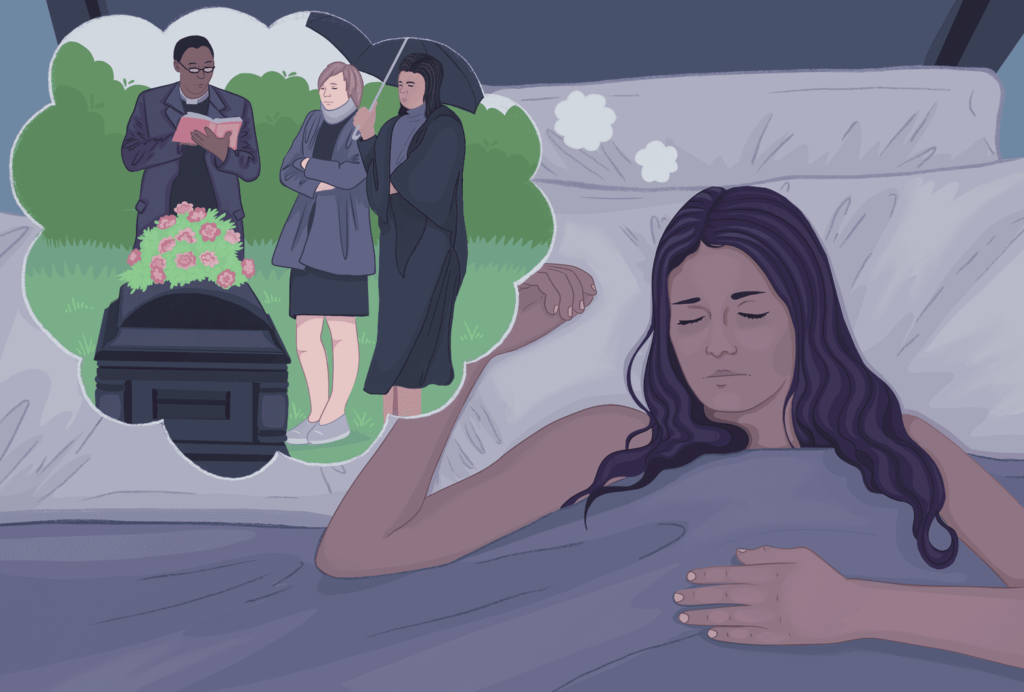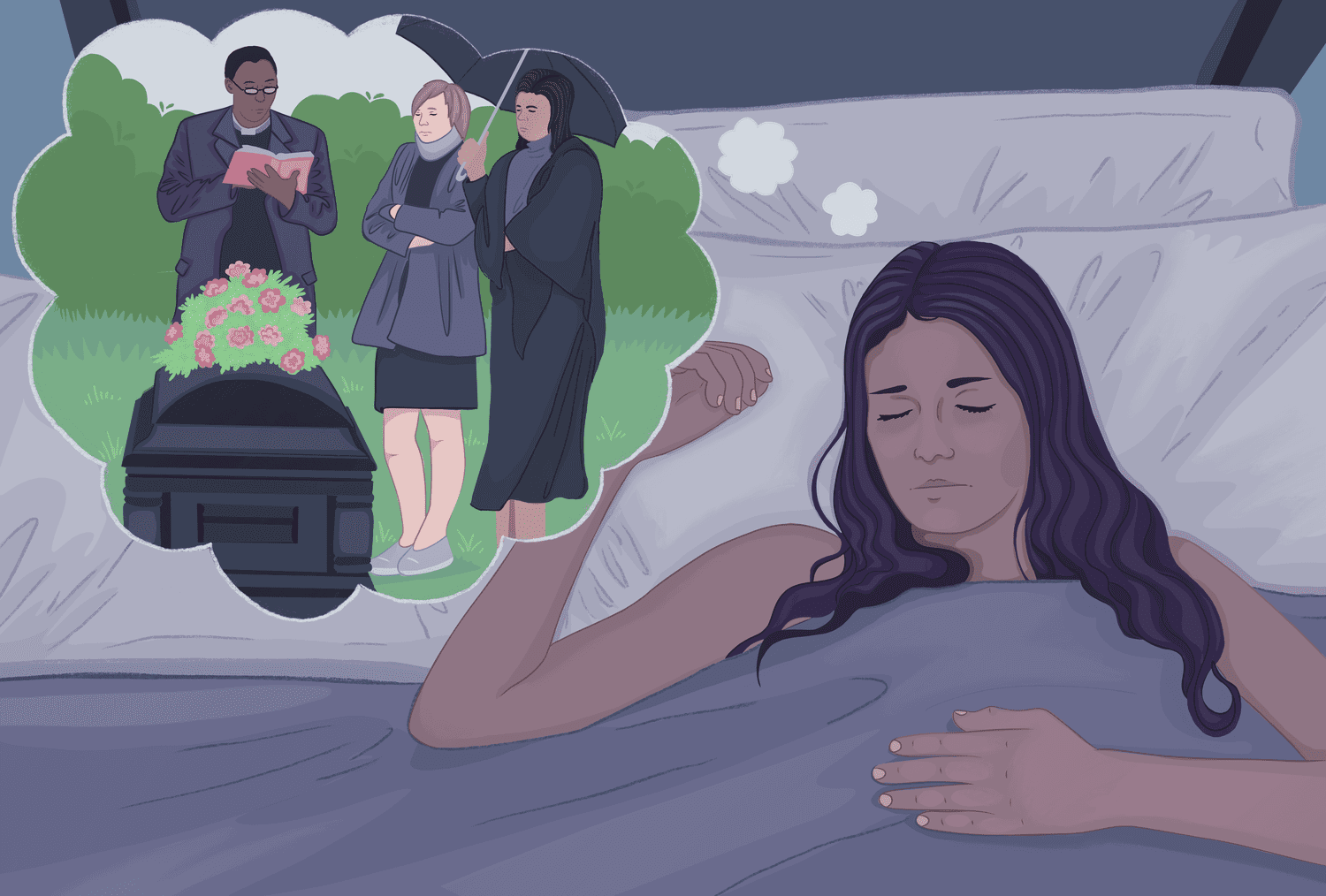Nightmares are unsettling and highly vivid dreams that can evoke intense feelings of fear, anxiety, or distress. They frequently involve scenarios that are scary, unpleasant, or emotionally unsettling. Nightmares predominantly occur during the rapid eye movement (REM) phase of sleep, characterized by heightened brain activity and vivid dreaming.
Common themes in nightmares encompass situations like being pursued, attacked, experiencing a fall, losing a loved one, or confronting life-threatening circumstances. The frequency and intensity of nightmares can vary, and they can be a natural component of the human sleep experience.
While sporadic nightmares are considered normal, recurrent or severe nightmares may be indicative of underlying factors such as stress, anxiety, trauma, or sleep disorders. If nightmares significantly disrupt your sleep or overall well-being, it is advisable to seek guidance from a healthcare professional or a sleep specialist who can provide assistance and explore potential treatment options. In the post, we are going to show you 7 nightmares that everyone must have experienced at least once.
7. Startling Drop

Experiencing a fall within a dream is a widespread and often disconcerting dream scenario. It can evoke emotions like fear, anxiety, and disorientation, even though it’s not associated with any physical harm. Falling dreams can manifest in various forms and contexts, and their interpretation can be influenced by personal experiences and emotions.
In certain instances, falling dreams may be associated with a sense of losing control in your waking life or facing uncertain situations. It’s important to acknowledge that the interpretation of dreams is subjective, and the significance of a falling dream can differ from one person to another.
If recurring falling dreams cause distress or disrupt your sleep, it can be beneficial to maintain a dream journal to record these dreams and any emotions or real-life events that may be connected. Engaging in discussions about your dreams with a therapist or a dream analyst can also offer insights into potential meanings and assist you in gaining a better understanding of any underlying concerns or anxieties.
6. Soaring through the air

Dreaming of flight is an enthralling and exhilarating experience for many individuals. It transports them to a realm where gravity’s constraints and the limits of the physical world are suspended. Flying within a dream can manifest in diverse forms and evoke a wide range of emotions.
- Freedom and Empowerment: Flight often symbolizes a profound sense of freedom and empowerment. During these dreams, you might feel unburdened, capable, and entirely in command of your movements. It’s as if the sky becomes your playground, granting you the freedom to explore the world from above.
- Escapism: Flying dreams can serve as a brief escape from the demands and stressors of daily life. They offer a temporary reprieve from the ordinary and transport you to a realm where the extraordinary becomes attainable.
- Overcoming Challenges: Flight can be a symbol of your desire to overcome obstacles and ascend to new heights, both in your personal life and in your professional endeavors.
- Imagination and Creativity: Flying dreams often tap into the creative and imaginative facets of your psyche. They encourage you to think innovatively, fostering an openness to unconventional ideas and solutions.
- Spiritual or Transcendent Experiences: For some, flying dreams are associated with spiritual or transcendent encounters. They may reflect a profound sense of spirituality or a connection to something beyond the ordinary realm.
- Release of Inhibitions: Flying dreams can be linked to a release of inhibitions. Within this dream state, you may find yourself more daring and willing to embrace risks, mirroring a desire for greater freedom in your waking life.
- Lucid Dreaming and Control: Interestingly, individuals who practice lucid dreaming can intentionally initiate flying experiences in their dreams, exerting control over their dream narratives.
While flying dreams are often enjoyable and liberating, their interpretation can vary significantly among individuals. They may offer glimpses into your unique experiences, emotions, and aspirations. Delving into the emotions and context surrounding your flying dreams can provide valuable insights into your subconscious desires and goals.
5. N*ked in dream

Dreams featuring n*dity can evoke a variety of emotions and thoughts, often contingent on the dream’s context and your personal associations. Here’s a breakdown of potential interpretations for dreams involving n*dity:
- Vulnerability: Being uncloth*d in a dream frequently symbolizes vulnerability. It may signify a fear of exposure, whether regarding your true self, insecurities, or a situation in which you feel judged or exposed in your waking life.
- Authenticity: Conversely, n*dity can represent authenticity and a desire to reveal your true self without pretense or concealment. It might reflect a longing for increased openness and honesty in your interactions.
- Insecurity: N*dity in dreams can reflect personal insecurities or apprehensions about how others perceive you. It may suggest struggles with self-esteem or concerns about being judged.
- Self-Acceptance: Alternatively, such dreams might convey a sense of self-acceptance, encouraging you to embrace your imperfections and vulnerabilities as integral aspects of your identity.
- Exposure: If your dream elicits embarrassment or anxiety, it could relate to real-life situations where you fear being caught or exposed for something concealed or undertaken.
- Freedom: For some individuals, being n*de in a dream symbolizes liberation and a desire to break free from societal constraints, norms, or expectations.
- Renewal and Transformation: In certain contexts, n*dity in a dream may signify transformation or a fresh start, shedding old layers and welcoming a new phase in life.
- S*xuality: Depending on the dream’s specifics and your emotions within it, n*dity can also carry s*xual connotations, potentially linked to desires, intimacy, or your relationship with your body.
It’s important to recognize that dream interpretation is highly personal and context-dependent. To gain deeper insights into your dream, contemplate the emotions, circumstances, and associations intertwined with the experience of being n*ked in the dream. Exploring what resonates with you individually and how the dream connects to your real-life experiences and emotions can be enlightening.
4. Running Behind Schedule

Experiencing a dream where you find yourself running late is a familiar and relatable scenario. Such dreams often evoke feelings of stress, urgency, and occasionally frustration. Let’s delve into the possible meanings behind dreaming about running late:
- Anxiety and Stress: Dreams of running late often mirror real-life anxieties and stressors. They could be connected to impending deadlines, responsibilities, or commitments that you fear you might not fulfill in your waking life.
- Time Management: These dreams may reflect concerns about your ability to manage your time effectively. You might be grappling with the pressure of juggling various aspects of your life efficiently.
- Fear of Missing Out: Dreaming of running late might also signify a fear of missing out on opportunities or important events. It could be linked to a desire to be present and not allow significant moments to slip away.
- Control Issues: Running late in a dream can sometimes indicate a sense of lacking control over your life circumstances or a situation that feels like it’s slipping out of your grasp.
- Self-Expectations: Such dreams might be tied to high self-expectations and the fear of falling short of your own standards or the expectations of others.
- Unresolved Matters: Running late in a dream may symbolize unresolved issues or pending tasks in your waking life that require your attention. It could serve as a reminder to address these matters to prevent feeling rushed or overwhelmed.
- Impatience: Dreams of running late could reveal impatience or a strong desire for immediate results in your endeavors. You might be eager to witness progress in specific areas of your life.
- Fear of Being Left Behind: If your dream involves running late to catch someone or something, it could be associated with a fear of being left behind in a personal or professional context.
It’s important to remember that dream interpretation is subjective, and the meaning of running late in a dream can vary from person to person. To gain a deeper understanding of your dream’s significance, reflect on the emotions, circumstances, and associations linked to the dream. Consider how it relates to your current life situation and any underlying concerns or pressures you may be experiencing.
3. Pursued in a Dream

Dreams of being pursued, where you find yourself chased by someone or something, are a common and intense dream scenario. These dreams often trigger a sense of fear, anxiety, or even panic. Here’s an exploration of what it might mean to dream about being pursued:
- Fear or Anxiety: Dreams of being pursued typically reflect underlying fears or anxieties in your waking life. They might represent concerns or situations that you’re trying to escape from or avoid.
- Conflict or Confrontation: Being pursued in a dream can symbolize a confrontation you’re avoiding or a conflict you’re trying to evade. It may highlight a need to address unresolved issues or face challenges head-on.
- Pressure or Stress: These dreams can be a manifestation of stress or pressure you’re experiencing. The pursuit may symbolize the mounting stressors that you’re trying to escape.
- Facing Your Fears: On the other hand, being pursued in a dream might also signify a subconscious effort to confront your fears or challenges. It’s as if your dream is urging you to face what’s pursuing you in your waking life.
- Unfinished Business: Such dreams could be linked to unfinished tasks, responsibilities, or commitments that you’re trying to avoid. They may serve as a reminder to address these matters.
- Self-Evaluation: Dreams of being pursued may prompt introspection. They can encourage you to examine your actions, decisions, or behaviors in your waking life and whether they’re leading to the pursuit.
- Motivation for Change: Being pursued in a dream can sometimes act as a catalyst for change. It may signify a need to alter your course, make decisions, or take actions to avoid unwanted consequences.
- Inner Conflict: These dreams can also reflect inner conflicts or dilemmas. You might be torn between different choices, and the pursuit symbolizes the pressure to resolve these conflicts.
It’s important to recognize that dream interpretation is subjective, and the meaning of being pursued in a dream can vary from person to person. To gain a deeper understanding of your dream’s significance, reflect on the emotions, circumstances, and associations connected to the dream. Consider how it relates to your current life situation and any underlying concerns or pressures you may be experiencing.
2. Cramps at Night

Experiencing night cramps in a dream can be a puzzling and uncomfortable situation. These dreams often replicate real-life physical sensations or discomfort and can evoke distressing emotions. While the precise meaning of night cramps in a dream can vary, here are some possible interpretations:
- Physical Discomfort: Dreaming of night cramps might result from physical discomfort or tension experienced during sleep. Your brain may incorporate these sensations into your dream, leading you to dream about cramps.
- Stress and Tension: Night cramps in dreams may also reflect stress or tension in your waking life. If you’re under stress or feeling anxious, it can manifest in your dreams in various ways, including physical discomfort.
- Body Awareness: These dreams could indicate an increased awareness of your body, especially if you’ve recently experienced cramps or muscle pain in reality. Your subconscious mind might process and interpret these sensations during sleep.
- Metaphorical Interpretations: In some cases, dreams of night cramps may have metaphorical meanings. They might symbolize a sensation of being “cramped” or constrained in some aspect of your life, such as personal space or emotional freedom.
- Need for Relaxation: Night cramp dreams may serve as a reminder to relax and relieve physical or emotional tension in your life. They could be prompting you to pay attention to self-care and stress management.
- Medical Concerns: On occasion, recurring dreams of night cramps could be your subconscious mind signaling potential medical concerns or issues that warrant attention. If you frequently experience such dreams, it might be worthwhile to discuss them with a healthcare professional.
It’s essential to remember that dream interpretation is subjective, and the meaning of night cramps in a dream can vary based on your personal experiences and emotions. To gain a better understanding of the dream’s significance, reflect on the context, emotions, and associations connected to the dream. Consider whether there are any stressors or physical sensations in your waking life that might have triggered this dream.
1. Loosing a loved one

Experiencing a dream about the death of a loved one can be emotionally intense and distressing. These dreams can evoke a range of emotions and often leave you feeling shaken. Here’s an exploration of what it might mean to dream about the death of a loved one:
- Loss and Grief: Dreams of a loved one’s death may reflect unresolved feelings of grief or loss. These dreams can provide an outlet for you to process and cope with the pain associated with the passing of someone close to you.
- Emotional Processing: Dreams serve as a way for your subconscious mind to process complex emotions. Dreaming of a loved one’s death may indicate that you’re still grappling with the emotional aftermath of their passing.
- Unfinished Business: Sometimes, these dreams can be linked to unresolved issues or unexpressed emotions related to the deceased loved one. You might be harboring regrets or unspoken feelings.
- Mourning and Healing: Dreaming about a loved one’s death can be a natural part of the mourning and healing process. It allows you to revisit memories and feelings associated with the person, helping you come to terms with their absence.
- Symbolic Representation: In some cases, the death of a loved one in a dream may not be about the literal death but rather symbolize the end of a particular phase in your life, a significant change, or the closure of a chapter.
- A Need for Closure: These dreams might signify a desire for closure or a need to say goodbye mentally to the person who has passed away. They can offer a sense of connection and a way to honor the memory of the loved one.
- Embracing Change: Dreaming of a loved one’s death can also be a symbol of transformation and personal growth. It may represent a transition or a readiness to move forward in some aspect of your life.
- Spiritual or Transcendent Experience: In some belief systems, dreaming of a loved one’s death may be seen as a spiritual or transcendent experience, suggesting a connection with the afterlife or the person’s spirit.
It’s crucial to understand that dream interpretation is highly subjective. The meaning of such dreams can vary significantly based on your personal experiences, emotions, and the context surrounding the dream. Reflect on your feelings during and after the dream and consider any unresolved emotions or issues related to the loved one. These dreams can provide an opportunity for emotional healing and growth if approached with mindfulness and sensitivity.
